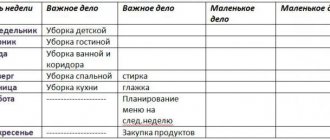The key to your success is a well-designed schedule and house rules. Moreover, this applies not only to the work space, but also to your private life. You shouldn’t take the article as truth in the first instance, but it still wouldn’t hurt to listen to our recommendations: everything has been tested on yourself.
What is the daily routine
- Proper use of sleep time.
- Time for nutrition and personal hygiene.
- Proper distribution of time for rest and work.
- Time for physical activity and sports.
The ability to create the right daily routine makes us disciplined, develops focus and organization.
Thus, a life rhythm is developed, where the expenditure of time, as well as energy, on minor things that can be done without is reduced to a minimum.
In this article, we will try to comprehensively answer the most important questions regarding the daily routine for a healthy lifestyle, we will talk about the impact that biorhythms have on the effectiveness of activities, as well as methods and methods for creating an effective day for different categories of people.
A little theory about the daily routine
We often wondered about the daily routine of a successful person. The secret of these people is that their daily routine is thought out to the smallest detail; they plan their time in order to distribute it rationally and as efficiently as possible.
The ability to correctly place emphasis and, as a result, manage your working time is of great importance for discipline and organization. And if you are interested in developmental or training programs, want to stick to a diet or organize proper nutrition, you cannot do without a daily routine.
A person needs a routine so that time does not take advantage of our absent-mindedness. Sooner or later, every person in his activity is faced with haste, the feeling that time is amorphous, and confusion arises in work and personal affairs.
Think about it - can you honestly answer the question right now of how much time was spent on this or that activity without controlling the use of your time? A daily routine for a healthy lifestyle allows you to effectively and competently manage your time, and being deprived of the valuable planning skill, it is impossible to make long-term plans.
There are only 2 types of biological rhythms - external and internal
(respectively, exogenous and endogenous). They appear in synchronization with the internal cycles of the body (sleep and wakefulness), as well as external stimuli (the change of day and night).
When composing a regime, circadian regimes are of greatest interest.
– these are cyclical fluctuations in the intensity of various biological processes that are associated with the change of night and day. Their period is equal to a full day - 24 hours.
The influence of biorhythms
When creating an effective daily routine, one cannot ignore the biorhythms of the human body. Practice shows that the so-called “larks”, having slept until 2 o’clock in the afternoon, having previously gotten used to waking up at 7 am, feel lethargic and are slow in their pace of activity.
In the context of this section, we will give a definition of biorhythms
– these are periodically repeated changes in the nature and intensity of biological processes, as well as phenomena in living organisms, on which functionality depends.
Pre-planning
Abraham Lincoln said, “Give me six hours to cut down a tree, and I will spend four of them sharpening the axe.” Another habit that highly successful people have is pre-planning. Many of them prefer to make a plan for the next day before going to bed or do it in the morning, immediately after getting up. Of course, life can sometimes be unpredictable, but in most cases it is easier to make key decisions consciously and methodically if you do not think about them in a reactive mode, getting lost in the frantic rhythm of life.
How to create a daily routine for owls and larks
Psychologists often refer to the well-known distribution of people, depending on their period of activity, into “larks” and “night owls.” The latter make great efforts to get up early in the morning; they are most active at night and in the evening. Larks, on the contrary, are literally boiling with energy in the morning, which is depleted in the evening.
This classification is very conditional, since if the correct daily routine of an adult has been drawn up, then, if desired, the type of wakefulness can be changed without causing harm to the body. The main thing is to choose a strategy and show willpower.
Athletes, businessmen and politicians who travel a lot often cannot adhere to any standard schedule, therefore the daily routine of great people is often radically different from the daily routine of an ordinary person. These people, constantly under pressure from jet lag, find it very difficult to remain effective in their work. To do this they use the following actions:
- The first days upon arrival are planned in such a way as to reduce physical and psychological stress.
- 2 days before the flight, light food is consumed, alcohol and unusual dishes are excluded.
- If you have to fly from east to west, if you have a choice, it is better to give preference to an afternoon or morning flight. When traveling by plane from west to east, it is better to give preference to an evening flight.
It has been proven that it is absolutely impossible to create a universal daily routine for months to a year that will suit each of us. There are too many personal factors to consider, but key points that can be called global and applicable to everyone can be highlighted. A few details.
Hobby
Every person needs time that he can spend exclusively for his own pleasure, for himself and only. Man is a deeply social creature, but nevertheless needs personal space. A variety of hobbies will help you spend a little time alone with yourself and still have fun. For some, it’s playing musical instruments, others love beadwork, others find themselves in writing poetry. Your hobby must have a place in your daily routine. Half an hour or an hour of time that you can spend doing your favorite activity is certainly calming, relaxing, causes extremely positive emotions and can be an excellent antidepressant.
About the importance of sleep
Regardless of whether the daily routine of a woman or a man is drawn up, sleep must be given special attention. We live in interesting realities, when people do not devote the proper amount of time to their rest, or sleep longer than the body really needs. This, as a result, has a negative impact on human activity, and a clear daily routine and sufficient time for sleep give you many advantages - a person can rest and recover, there is no risk of sleep and nervous system disorders.
The best period for sleep is from 11 pm to 7 am.
Research shows that 7 to 8 hours of sleep per night is enough for an adult. There are successful people for whom 3 to 6 hours of sleep is enough, but this is rather a rare exception.
Recommendations for those who want to set their own schedule and go to bed earlier:
- Stop surfing the Internet or watching TV series and devote time to your favorite book before bed.
- A couple of hours before you go to bed, take time for light exercise - running, walking, cycling.
- Don't eat heavy food at night.
- Ventilate the room before going to bed.
Scientists say: willpower is strongest in the morning, so get down to business actively
You've probably heard this advice: the first task of the day should be something significant and significant - a task that requires high concentration, will and determination.
The reason is simple: our self-control is limited. This concept is visualized using the force model. Self-control is formed on the basis of common resources, which are depleted over time. Willpower can be thought of as a muscle where stress causes fatigue.
At the University of Nottingham and the National Institute of Education, Singapore, researchers analyzed 83 studies on self-control and came to the following conclusion:
Results revealed a significant effect of attenuation of internal forces on performance on self-control tasks. The strongest effects of resource depletion were on effort, perceived task difficulty, negative emotions, subjective fatigue, and blood glucose levels.
For those who work from home, both psychological and physiological factors influence the ability to perform work.
The closer it gets to the evening, the stronger the “fatigue,” weakening willpower. This means that it is all the more important to benefit from early mornings.
How to create a daily routine - let's move on to practice
About eating. Everyone knows that proper nutrition is very important for the functioning of all body systems. Food is a kind of fuel for the body; with it we will not only get energy for the day, which we will spend during the day on physical and mental activity, but also provide the body with microelements and vitamins.
It is very important to eat nutritiously and regularly; any diets must be agreed with your doctor before practical use.
Point two – rest.
The correct daily routine for an adult involves mandatory rest, during which the body’s strength and performance are restored. During working hours, a person cannot do without rest, because it is impossible to maintain a consistently high working capacity without it. Do not refuse breaks from work, as they will give you new strength and greater efficiency and productivity at work.
It is very important to get proper rest after work.
Let's say you spend all day at the computer. When you return home, give up spending time with him, devoting time to communicating with family, reading or self-education.
A little about work. Each of us works, regardless of age. Children attend schools, students attend seminars and lectures, adults earn a living and build a career. It is very important to plan your working time. Time management technique. Self-management techniques and recommendations that will allow you to increase personal efficiency at work are presented in a large assortment on the Internet - you just need to choose the most suitable option.
Don't forget about physical activity, even if you are creating a daily routine for a girl.
Physical education is health; training should be considered, first of all, by those whose work limits the physical activity of the body throughout the day.
If it is not possible to visit swimming pools and gyms, you can exercise at home or on sports grounds.
The basis of time management is goal setting
A person has values, fundamental life positions and goals. A person's success depends on how aligned his goals and values are.
All stress, conflicts, and uncertainties arise when your actions contradict your internal values. What steps are you taking to make your actions even more consistent with your beliefs?!
To achieve results, you need to have a clear idea of what you want to achieve and in what direction to develop. A road without a goal is a path to nowhere. When you do something, constantly ask yourself for what purpose you are doing it. You can only get closer to your goal when you know what your goal is.
Make a to-do list of what you did during the month, week, day. There will be fifty cases. But only 3-5 of them provide 80% success. 10 skills can be well developed, of which 2-3 types of activities are better than other people.
View your time as an investment in the 2-3 activities that will contribute most to your future. By investing 80% of your time in this way, you will get closer to your goal every day.
Constantly ask yourself the question of how consistent the achievement of your plans at the moment is with what you are doing now. What is the most valuable investment of time? The correct answer is to spend time on what is most important to achieve your goal at that moment.
Now go back to your daily to-do list and rank all tasks into categories A, B, C, D, E. The importance of each task is determined by the level of consequences for you, from the results of its implementation or failure to complete it:
- Category “A” tasks
- Category “B” tasks
- Category “B” tasks
- Problems of category "D"
- Category “D” tasks
is something you must do that has serious consequences depending on whether you solve these problems or not. Doing it will bring you great benefit, not doing it will be against you. Category “A” cases provide 80% of the result.
is something that should be done, but has moderate consequences if done or not done. In case of non-compliance, inconveniences may arise, but nothing serious will happen. Never take on tasks of category “B” if there are tasks of category “A” that have not been completed.
- these are things that would be good to do. These are easy and pleasant things - sitting with friends, chatting on social networks, drinking a cup of coffee... These are things that do not have any impact on your future. Eliminate all category “B” tasks from your workday to leave more time for completing “A” and “B” tasks.
- this is everything that can be entrusted to others. Delegate everything that does not have consequences for the future in order to free up time for solving problems of categories “A” and “B”.
- unimportant tasks that can be abandoned without any damage or discomfort.
You can take control of your time if you give up tasks that are not important or of low value to you.
When there are several “A” category tasks in your plan for the coming day, then rank them according to the level of consequences at A1, A2, A3 and start completing them from A1. This is the most important time management skill you can master.
Results are obtained by regularly taking steps leading to the intended goal. Break down large tasks into small tasks, this will make them easier to complete and easier to control completion at each stage.
Practical recommendations
“The dullest pencil is better than the sharpest memory.” Write down your ideas using diaries, special programs, or just a sheet of paper. The routine displayed on paper will constantly remind you of things to do.
Don't be disingenuous
– in the initial stages, include in your schedule what you do throughout the day. Add to the schedule those items that will be accurately completed. So, if you can’t go to the gym for a long time and add this item to your schedule without doing it, this is not the best solution. The daily routine must be followed.
Consider physiology
– each of us has needs and, while creating a mandatory routine for every day, we cannot neglect them. Staying up late, giving up personal hygiene and eating as and when you want is not the best choice.
Separate the important from the unimportant
Very successful people keep the number of decisions they make to a minimum. They manage to do this precisely due to a clear daily routine, in which various trivial questions already have simple answers. Clothes that you don’t need to think about choosing, like Steve Jobs’ famous blue jeans and black turtleneck, the same breakfast every day, the same physical activities at a strictly designated time. Having chosen something once (we are talking about simple daily decisions), they prefer to stick with it on a long-term basis in order to free up their minds for what really matters. When you constantly think about what to wear, what to eat, where to go to exercise, you are quietly wasting not only valuable time, but also mental energy.
How to create a daily routine for an entrepreneur?
Based on the above, let's try to create a work plan for a novice entrepreneur. The very first thing you need to do before the start of the business day is to re-familiarize yourself with the tasks and goals that you plan to achieve. Study how many new contacts you need to make, how many letters to send, how many calls? The list of cases will directly depend on the nuances of doing business.
It is extremely important to draw up and adhere to calendar planning, which, we note, is closely related to goal setting,
as well as tasks for every day. Using a calendar plan, you can distribute events across days over a long period of time, following a previously created schedule.
Suppose a to-do list has been created and you have even started to implement them. If the amount of work that was planned makes your head swell and you absolutely don’t know where to start, it’s time to study the work plan of the average entrepreneur, which we present below.
Where to begin
We analyze regular and email. Working with morning mail is very important - you learn about key events, respond to partners, and establish new contacts.
Step two
- phone calls. Get a list of clients and partners that you need to call today in order to resolve any issues that arise. After making all the necessary calls, be sure to check the box in your plan - they say, the job is done.
Reading
- the most important thing. Study new, useful information for your core activities, using not only offline, but also online sources. Visit profiled forums, download useful books and articles.
Things to do for the evening
Before you go to bed, do not forget to complete these activities. The first and most important thing is to check your email for new messages. If there is something urgent, we respond without delay.
Put things in order on your desktop - work notes, printouts of articles, books, office supplies. Put all this away until tomorrow, today you are already resting. Don't forget to make a to-do list for tomorrow and check it against the calendar plan you created earlier.
Ask yourself if this is the meeting you need to be in.
Meetings, meetings, presentations - all this eats up a lot of your time. Usually such events are scheduled inconveniently and are completely ineffective. Why are they even needed?
Why do we appear on them?
- We don't want to upset the other person. He made an appointment with you, which means he needs to discuss something. Reluctantly, you agree to come to the meeting, sacrificing your important matters.
- We feel included in the process. For example, if the whole team meets to discuss a project, you feel like you have to show up. Otherwise, your colleagues will think that you are not as dedicated as others.
- The desire to be in the know. If a meeting seems important (for example, someone from management will be present or a fateful decision is planned), you naturally want to be there.
In fact, your efficiency could be higher if you stayed at your desk and stayed focused on the process. How do you know which meeting you need to attend and which you can skip? Use this rule.
You should come to the meeting if:
a) you are confident that your presence will influence the outcome of the meeting,
b) you will increase your effectiveness thanks to this meeting.
To determine whether your presence will affect the outcome of the meeting, ask yourself whether you are going to talk about your work or want to sit silently. Perhaps there will be someone in the room who can express your opinion more confidently and better.
To determine whether you will be more effective after this meeting, ask yourself if you will learn anything new from this meeting. If you don't learn anything new, aren't willing to ask questions, don't talk about your work, and therefore don't expect constructive criticism, then your effectiveness is unlikely to improve.
If in neither the first nor the second case you cannot explain to yourself why you need to come to this meeting, skip it. Your time is limited and you need to use every minute wisely.
How to create a child's daily routine
Child's daily routine
- this is responsibility and discipline that will help the child adapt to the new conditions of kindergarten and school. But besides this, drawing up a child’s routine greatly helps parents cope with their responsibilities on time.
Undoubtedly, such events save time, which the mother can spend on relaxation, on herself, or on her beloved spouse.
For babies
The first years of life are especially important for the future development of good health of the toddler. He must get enough sleep at least 4-5 times a day, eat food about 6 times and take walks in the fresh air at least 2 times a day.
In order not to forget anything and not get confused, you need a strict daily routine:
- 06.00 First meal, continued rest.
- 09.00 The baby wakes up, brushes his teeth, and washes himself.
- 09.30 Second meal, games, wakefulness (at the toddler’s discretion).
- 10.00 The baby gets dressed and gets ready for fresh air.
- 10.30 Promenade in a stroller or in mom’s arms.
- 13.00 Third meal.
- 13.30 Rest.
- 16.30 Meal, light snack.
- 17.00 Walk, games, communication (depending on what the baby wishes).
- 20.00 Hearty dinner.
- 20.30 Communication with family and friends.
- 23.00 Wash and brush your teeth at night.
- 23.30 Light snack.
- 00.00 A good night's sleep.
Many people are concerned about the fact that the child goes to bed so late, otherwise there is a possibility that the baby will wake up during the night and ask for food, and then the schedule will be disrupted. When the baby is a little older, you can put him to bed at approximately 9 pm.
In kindergarten
A properly designed daily routine allows the child to quickly adapt to the new place and schedule of the educational institution:
- 7.00-8.00 Arrival at kindergarten, communication.
- 8.00-8.30 Morning meal.
- 8.30-9.00 Self-education, cognitive activity in a group.
- 9.00-9.15 The baby gets dressed for outdoor activities.
- 9.15-11.30 Games, communication outdoors.
- 11.30-11.45 Return, wash the baby’s hands, prepare food.
- 11.45-12.30 Hearty, delicious lunch.
- 12.30-13.00 Games, getting ready for bed.
- 13.00-15.00 Day rest.
- 15.00-15.30 Light snack.
- 15.30-17.00 Training, group classes.
- 17.00-18.00 Outdoor recreation.
- 18.00-18.30 Hearty dinner, enriched with vitamins.
- 18.30-19.00 Going home.
- 19.00-19.30 Promenade with family and friends.
- 19.30-20.00 Games, light dinner.
- 20.00-20.30 Washing, brushing teeth at night.
- 20.30-7.00 A strong and sweet night's rest.
Limited time
The daily routine implies a clear plan, but often it indicates a certain, but very vague time for solving any tasks. In the modern world, success comes to people who know how to focus on a task and solve it quickly. Breaded, hours-long meetings, conferences, and brainstorming sessions, as a rule, lead nowhere. The age of technological progress has led to the fact that people are accustomed to focusing attention and quickly switching from task to task. Good leaders are aware of this feature and understand that if a task was not completed in the allotted time, then “extra minutes” will not change that. And this time is not measured “from pick-up to lunch”; it is not counted by the clock.
Before they start working, they think
Successful people know where they are at the moment. To maintain this understanding throughout the workday (which is very helpful in setting goals and objectives for the future in general), they are in no hurry to get out of bed. To start, they will sit down and think about the day ahead to create a tentative plan in their head.
"To get the best results, you need to think about where you've been, where you are now, and where you want to go," says workplace expert Lynn Taylor.











